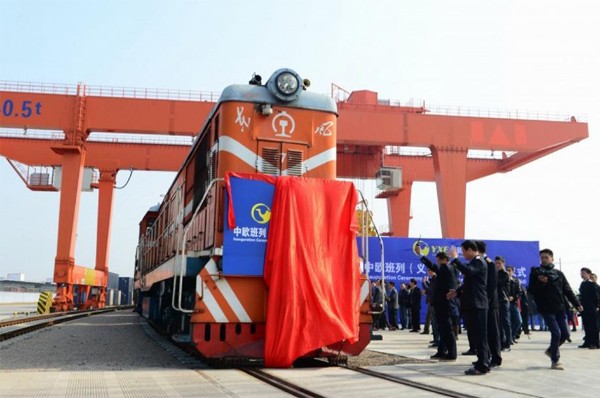China on Nov. 18 launched an 82-wagon cargo train service connecting Yiwu in Zhejiang Province with Madrid, Spain, that can travel some 13,000 kilometers on a trip that will take 21 days to complete.
Yiwu is an industrial center south of Shanghai known for its small commodity wholesale market.
Dubbed "Yixinou," the train is expected to reach Madrid by December after passing through Kazakhstan, Russia, Belarus, Poland, Germany and France.
The new 13,000-kilometer line connecting Yiwu with Madrid is longer than the famous Moscow-Vladivostok connection. Businesses in Yiwu welcomed the Yixinou rail line saying it was cheaper than air transport and faster than shipping by sea.
Currently, the operation costs of the Yiwu-Madrid line is about 20 percent more than that of shipping by sea, according to a report by Want China Times, but authorities said that the cost will drop as both export and import values increase.
China has maintained that it was optimistic about connecting Yiwu, the world's largest wholesale market for small consumer goods, to Europe by railway.
On Sept. 28, Chinese President Xi Jinping, following his meeting with Prime Minister Mariano Rajoy of Spain in Beijing, said: "China looks forward to the West's proactive participation in building and operating the Yiwu-Madrid line that would help boost the level of cooperation between China and Spain."
The launching of the Yiwu-Madrid cargo train service is also widely seen as part of President Xi's initiative at creating a "New Silk Road" which will better connect China with the rest of the world.
Previously, the Chinese president unveiled a $50-billion fund for the "21st Century Silk Road Economic Belt and Maritime Silk Road" program, which will enhance China's trade links with key regions and much of the rest of the world.
Notwithstanding the massive economic potential of the Yiwu-Madrid route, some have voiced their concerns about continued sustainability given the costs of operating a railway freight line.
"There will be no profit margin unless the price per cargo unit per kilometer drops to $0.60. It is only with this figure that the price of transporting goods with trains could compete with that of marine transit and attract clients. The current cost is $0.70 per cargo unit per kilometer," Chongqing mayor Huang Qifan told Want China Times.
"If the cost remains high, the government should subsidize," Huang added.



























